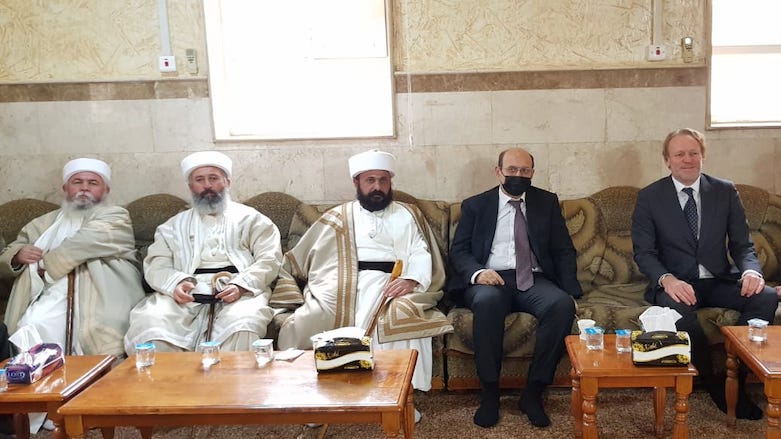Yezidi leadership appreciates Dutch support for Yezidi community
Yezidi leadership thanks Dutch government for continued support

ERBIL (Kurdistan 24) – The Dutch Consul General in Erbil, Hans Akerboom, told Kurdistan 24 during a visit to the Yezidi holy temple in Lalesh in Shekhan on Tuesday that the Dutch authorities support the Yezidis that suffered under the so-called Islamic State.
The Dutch Consul was received by Mir Hazim Tahsin Beg, leader of the Yezidis in Iraq and the world, and Ali Elias Haji Nasir, the new top spiritual leader, also known as Baba Sheikh, who succeeded the late Khartu Hajji Ismael who passed away two months ago.
“We are here to visit the Yezidi community and we have to show, as the Netherlands, our respect to the Yezidis,” Akerboom stated. “They have suffered a lot during the fight against ISIS; therefore, we, as the Netherlands, continue to support Yezidis.”
“We have several projects all over Kurdistan and also the Sinjar [Shingal] region. This amounts to two and a half to three million Euros that we spent to support the Yezidi community [through NGOs and the United Nations].”
Very special to visit the Yazidi Temple in Lalish to speak with the new Baba Sheikh and Mir Hazim Tahsin Beg. Impressive to hear firsthand how the Yazidis suffered under Daesh. Good that we as the Netherlands support the Yezidis with various projects. #Yazidi pic.twitter.com/J2bkilKaHS
— Hans Akerboom (@jtmakerboom) December 23, 2020
More importantly, the Dutch government has repeatedly called for the accountability of atrocities committed by the so-called Islamic State, including those committed against the Yezidis. Last year, during a meeting in New York, the Dutch Foreign Ministry, with the support of human rights lawyer Amal Clooney, focused on getting justice for the crimes committed by the Islamic State.
For this reason, the Dutch also fund the UN team investigating Islamic State crimes to hold the terrorists to account.
Read More: Kurdistan president affirms support for UN team investigating ISIS crimes
During the meeting, the Yezidi leadership asked for more support for the reconstruction of Shingal and efforts to save hundreds of Yezidi women and children who are still missing.
According to data from the Yezidi abductees office, which was established by Kurdistan Region President Nechirvan Barzani, there are still nearly 3,000 missing Yezidis, including 1,300 women and children.
Before the Islamic State overran Shingal in August 2014, it was a region home to some 200,000 residents, most of them members of the Yezidi religious minority. The terrorist group proceeded to kidnap and massacre untold numbers of people, and thousands of women and girls were forced into sexual slavery. Those atrocities are now widely recognized as genocide.
Much of the city remains uninhabitable rubble, and very few of its former residents have returned to their homes.
Mir Hazim Tahsin Beg told Kurdistan 24 that they were delighted with the Dutch visit. “The Consul said there are projects,” he said. “The Netherlands has assisted [Yezidis] in the past and it will continue to do so.”
“We asked the Dutch Consul that the Netherlands, as an influential state, must be a participant in the reconstruction of Shingal. If the town is rebuilt, our people will return to their lands. So far, the reconstruction process in Shingal is poor.”
Moreover, he added that the agreement between the Iraqi government and the Kurdistan Regional Government (KRG) announced in October, with support from the UN is a positive development. “If implemented, our people will return to their town,” he said.
Read More: KRG and Baghdad reach administrative, security agreement on Sinjar
The plan involves understandings on security, civil administration, reconstruction, service rehabilitation, and the return of those displaced when the Islamic State took over the area in 2014. It also calls for competing armed groups to leave Shingal.
However, Beg said it would need time before the agreement “could be actualized, [with the support of the US and Baghdad].”
Moreover, Baba Sheikh, the religious leader of the Yezidis, told Kurdistan 24 that any agreement in Shingal must ensure Yezidi rights and not only focus on politics. “Any agreement, a security understanding, must guarantee the interests of our people.”
“If there is no international support, the situation in Shingal will not be resolved—and we demand a resolution,” he added.
He said Shingal has been neglected for too long. “Today, Shingal is wounded, it has been destroyed and nothing much is left. Comparing 400-500,000 people, you will find out that almost all of them have lost everything.”
“If the people returned to the town, they will not have a house to settle in, they might set up a tent—and that is no different than the camps,” he added.
Moreover, he added that there are no jobs, no buildings, no livelihoods in the Shingal region, and those in the camps do not have money to afford a meal.
Baba Sheikh said his home in Shingal is still destroyed, but he prefers the house of the poor “to be reconstructed before mine. I would like to see the ones in most need, those in the camps, to have a permanent shelter over their heads.”
However, Baba Sheikh said he was happy to have received the Dutch consul. “The Netherlands has supported us before; the visit is reassuring that the Dutch are considerate of our people, otherwise, this visit would not take place.”
Editing by Karzan Sulaivany